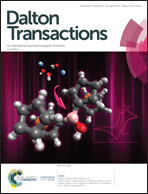Methylene spacer regulated variation in molecular and crystalline architectures of cobalt(iii) complexes with reduced Schiff base ligands: a combined experimental and theoretical study†
Abstract
Two heteronuclear cobalt(III)/sodium complexes, [(H2O)2Co(H2L1)Na(N3)2] (1) and (μ-N3)2[(N3)Co(H2L2)Na]2 (2) have been synthesized by the reaction of two compartmental reduced Schiff bases, H2L1 [(1,2-propanediyl)bis(iminomethylene)bis(6-ethoxyphenol)] and H2L2 [(2,2-dimethyl-1,3-propanediyl)bis(iminomethylene)bis(6-ethoxyphenol)], with cobalt(II) nitrate hexahydrate in methanol. Structures of both the complexes have been confirmed by single crystal X-ray diffraction analysis. In each complex, cobalt(III) is located in the inner N2O2 compartment and sodium is placed in the outer O2O′2 compartment of the respective ligands. In complex 1, the saturated five-membered chelate ring assumes a half-chair conformation, thereby facilitating the anti-orientations of two N–H bonds, which in turn favours the formation of very strong hydrogen bonds forming an infinite one-dimensional assembly. Formation of this one-dimensional chain is also supported by C–H⋯π (arene) interactions. On the other hand, the best hydrogen bond donor NH groups are in syn disposition (as the saturated chelate ring is six-membered and assumes a chair conformation) and do not participate in the crystal packing in complex 2. However, very strong C–H⋯π(N3) interactions have been established in complex 2, where the π-system of the bridging azide ligand participates as the π-donor. A search in the Cambridge structural database (CSD) has also been carried out to investigate the abundance and directionality of the interaction using different pseudohalides. Energies of all these supramolecular interactions were estimated by DFT calculations including Grimme's dispersion correction and characterized by the NCI plot index computational tool.



 Please wait while we load your content...
Please wait while we load your content...